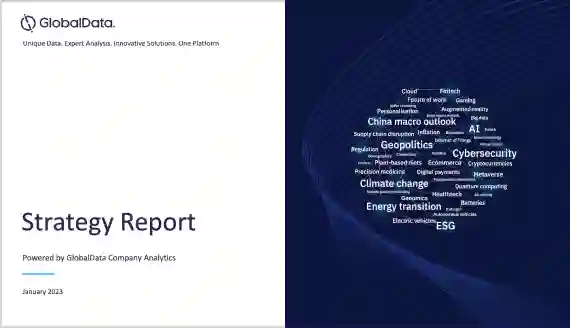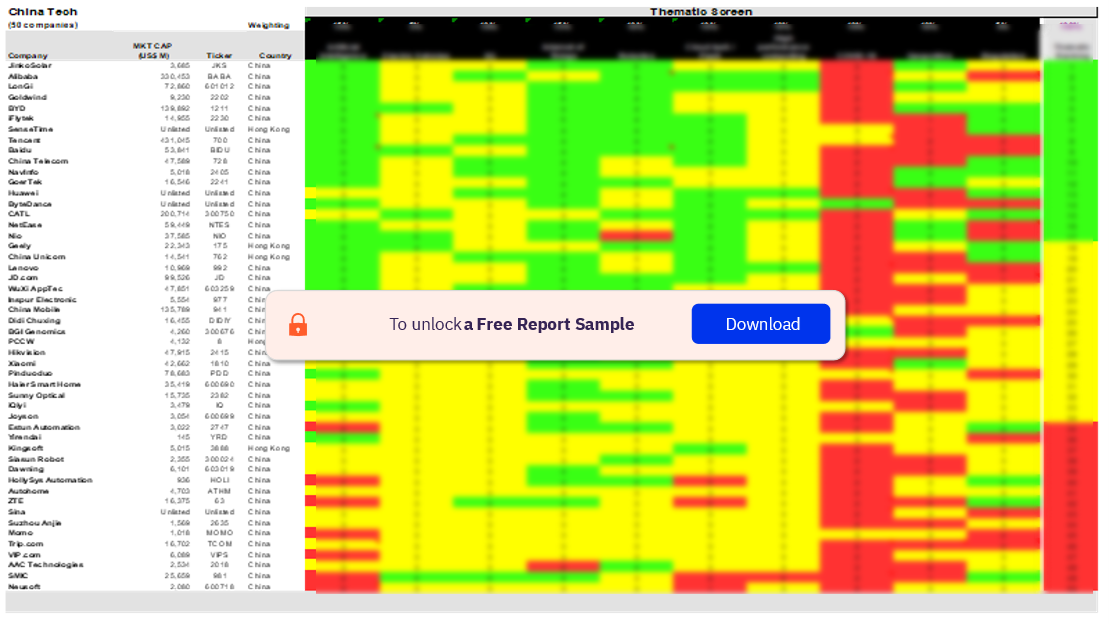China Tech – Thematic Research
Powered by ![]()
All the vital news, analysis, and commentary curated by our industry experts.
China Tech Theme Analysis Report Overview
China Tech’s thematic research report tackles the issue of whether China—despite severe geographic, demographic, and economic constraints—will lead the world into the Fourth Industrial Revolution by 2030. It also assesses whether this will spawn a Beijing-centered global economic security zone dependent on Chinese technology and largely independent of the West. This report also looks at the foundational technologies that will need to be advanced, converged, and widely deployed over the decade to birth and nurture the Fourth Industrial Revolution.
The China tech thematic intelligence report provides a briefing on the theme with a detailed analysis of market opportunity, and factors driving its development and adoption. The report also presents key technology, macroeconomic and regulatory trends impacting the theme. Furthermore, it includes a timeline charting the development of the theme, and information on major mergers and acquisitions.
| Report Pages | 72 |
| China Tech Sector Trends | Technology, Macroeconomic, Regulatory |
| Industries Covered | 5G, Robotics, Consumer Electronics, and Electric Vehicles |
| Leading Companies in China’s tech sector | Alibaba, BYD, CATL, Geely, Haier, iFlytek, Longi Green Energy Technology, SMIC, and Tencent |
| Enquire & Decide | Discover the perfect solution for your business needs. Enquire now and let us help you make an informed decision before making a purchase. |
Key Trends Impacting China’s Tech Sector
The main trends shaping Chinese technology are classified into three categories: technology trends, macroeconomic trends, and regulatory trends.
- Technology Trends – The key technology trends impacting the China tech sector are semiconductors, artificial intelligence (AI), high-performance computing, industrial robots, data centers, satellites, quantum computing, and wireless broadband.
- Macroeconomic Trends – The report analyses several macroeconomic trends impacting China’s tech sector including slowing birth rate, the lying flat movement, debt and real estate, Sino-Russian relations amid the Ukraine conflict, the digital silk road, the digital yuan and the rise of the renminbi, and little giants.
- Regulatory Trends – The report highlights the key regulatory trends impacting the China’s tech sector concerning COVID-19 regulations, China standards 2035, the ongoing regulatory crackdowns, the capital market predicament.
Buy the full report for more insights on key trends impacting China’s tech sector, download a free report sample
China and the Industries of the Future
As the great power competition increases between the US and China, the need to get ahead in the technologies of the future has never been of greater importance. Technologies such as AI, 5G, high-performance computing, robotics, and semiconductors are all industries within themselves but have the power to transform outcomes in almost every sector.
China and the industries of the future can be divided into three sectors: hardware, software, and platforms.
- Hardware: The hardware sectors include semiconductors, 5G, robotics, consumer electronics, EVs and energy storage, space technology, military technology, high-performance computing, biotechnology, and alternative energy.
- Software: The software sectors include autonomous vehicles and AI.
- Platforms: The platform sector includes smart cities platforms and internet platforms.
Download a free sample report or buy the full report for more insights on the key sectors in the China’s Tech sector.
Leading Companies Associated with China’s Tech Sector
Some of the companies making their mark in China’s Tech Sector are:
- Alibaba
- BYD
- CATL
- Geely
- Haier
- iFlytek
- Longi Green Energy Technology
- SMIC
- Tencent
Buy the full report or download a free sample report for more insights on the leading companies in the China’s Tech sector
China Tech Sector Scorecard
At GlobalData, we use a scorecard approach to predict tomorrow’s leading companies within each sector. Our sector scorecards have three screens: a thematic screen, a valuation screen, and a risk screen. Each sector scorecard has three screens:
- The thematic screen tells us who are the overall leaders in the 10 themes that matter most, based on our thematic engine.
- The valuation screen ranks our universe of companies within a sector based on selected valuation metrics.
- The risk screen ranks companies within a particular sector based on overall investment risk.
Sector Scorecard – Thematic Screen
Buy the full report to know more about sector scorecards related to China’s tech sector market, download a free report sample
Reasons to Buy
- As the great power competition increases between the US and China, the need to get ahead in the technologies of the future has never been of greater importance. Technologies such as AI, 5G, high-performance computing, robotics, and semiconductors are all industries within themselves but have the power to transform outcomes in almost every sector.
- This report looks at how things may play out for China in 14 of the key next-generation technology markets, providing invaluable insights for companies across industries.
1QBit
AAC Technologies
ABB
AbbVie
Accenture
Acer
Aimotive
Airbus
Aixtron
Alibaba
Alibaba (AutoNavi)
Alphabet
Alphabet (Google)
Alphabet (Waymo)
Amazon
Amazon Kuiper
Ambarella
AMD
AMS
Analog Devices
Ant Group
Apple
Applied Materials
Aptiv
ASML
Atos
Aurora
AutoX
Aviation Industry Corporation of China
BAE Systems
BAIC
Baidu
BeiGene
Beijing Tianbing Technology
BGI
Blue Origin
BMW
Boeing
Booking Holdings
Broadcom
BYD
ByteDance
Cadence
Cambricon
Canadian Solar
Canon
CATL
Cerebras
CETC
Chang Guang Satellite Technology
ChangXin Memory
Chengdu Aircraft Industry Group
China Aerospace Science and Industry Corp
China Aerospace Science and Industry Corp
China Aerospace Science and Technology Corp
China Mobile
China North Industries Group
China South Industries Group
China Telecom
China Unicom
China Yangtze Power
Chinese Academy of Sciences
Cirrus Logic
Cisco
CRISPR Therapeutics
Daihen
Daimler
Dawning
Dell
Denso
Didi Chuxing
Diodes
DJI
D-Wave Systems
eBay
Ecovacs
Electrolux
Electronic Arts
Enercon
Enphase Energy
Envision Energy
Epson
Ericsson
Estun Automation
FANUC
First Solar
Ford
Ford (Argo AI)
Foxconn
GAC Group
Galactic Energy
Garmin
GE
Geek+
Geely
General Electric
General Motors
Ginkgo Bioworks
Global Foundries
GM (Cruise)
GoerTek
Goldwind
GoPro
Graphcore
GSK
Haier
Hanwha Solar
Hefei National Laboratory
Hikvision
Hisense
Hitachi
HollySys
Honeywell
Honeywell
Hongdu Aviation Industry Group
Honor
Horizon Robotics
HP
HPE
HTC
Hua Hong
Huada Empyrean
Huawei
Huawei (HiSilicon)
Human Horizons
IBM
IBM
iCarbonX
iFlytek
Illumina
Infineon
Innovent Biologics
Inspur
Intel
Intel
Intellia Therapeutics
IonQ
iRobot
Itron
JA Solar
JD.com
Jiangsu Hengrui Medicine
Jinko Solar
Johnson & Johnson
Kawasaki
L3Harris Technologies
LAM Research
Largan Precision
Lenovo
Leonardo
LG Electronics
LG Energy Solution
Li Auto
Lockheed Martin
Longi Green Energy
Longi Green Energy Technology
Marvell
MediaTek
Megvii
Melexis
MercadoLibre
Merck & Co.
Meta
Meta
Microchip
Micron
Microsoft
Midea (KUKA)
Mitsubishi
Momenta.ai
Monolithic Power Systems
Murata
Nanterro
Nanya Tech
NEC
NextEra Energy
Nikon
Nintendo
Nio
Nissan
Nokia
Nordex
Northrup Grumman
Novartis
Novo Nordisk
Novogene
Nvidia
NXP
On Semiconductor
OnePlus
Oppo
Orsted
Panasonic
PayPal
Pegatron
Pfizer
Ping An
PlusAI
Pony.ai
Qorvo
Qualcomm
Quanta
QuantumCTek
Raytheon Technologies
Renault
Renesas
Rigetti
Roadstar.ai
Roche
Rockwell Automation
Rohm
Samsung Electronics
Samsung SDI
Sanofi
Scatec Solar
Schneider Electric
Seiko Epson
SenseTime
Senvion
Shanghai Pharmaceuticals Holding
Sharp
Siasun Robotics
Siemens
Siemens Gamesa
Silicon Motion
Sinohydro
Sinopharm Group
Sinovac Biotech
Sinovel
SK Hynix
Skyworks
SMIC
Softbank (Arm)
Sony
SpaceX
ST Micro
State Grid Corporation of China
Sungrow Power
SunPower
Suzlon Energy
Synopsys
Takeda
Talesun Solar
TCL
TE Connectivity
Tecno Mobile
Tencent
Teradyne
Tesla
Texas Instruments
Thales
Tokyo Electron
Toshiba
Toyota
Trina Solar
TSMC
TuSimple
Uber
UBtech
UMC
Verizon
Vestas Wind Systems
Virgin Galactic
Vivo
Volkswagen
Will Semiconductor
WuXi AppTec
X-EPIC
Xiaomi
Xiaopeng Motors
Yaskawa
Yingli
YMTC
ZTE
Table of Contents
Frequently asked questions
-
What are the key technology trends impacting China’s tech sector?
The key technology trends impacting China’s tech sector are semiconductors, artificial intelligence (AI), high-performance computing, industrial robots, data centers, satellites, quantum computing, and wireless broadband.
-
What are the key macroeconomic trends impacting China’s tech sector?
The macroeconomic trends impacting China’s tech sector are slowing birth rate, the lying flat movement, debt and real estate, Sino-Russian relations amid the Ukraine conflict, the digital silk road, the digital yuan and the rise of the renminbi, and little giants.
-
What are the key regulatory trends impacting China’s tech sector?
The regulatory trends impacting China’s tech sector are COVID-19 regulations, China standards 2035, the ongoing regulatory crackdowns, and the capital market predicament.
-
What are the key sectors in China’s tech sector?
China and the industries of the future can be divided into three sectors: hardware, software, and platforms.
-
Which are the leading companies associated with China’s tech sector?
Some of the companies making their mark within China’s tech sector are Alibaba, BYD, CATL, Geely, Haier, iFlytek, Longi Green Energy Technology, SMIC, and Tencent.
Get in touch to find out about multi-purchase discounts
reportstore@globaldata.com
Tel +44 20 7947 2745
Every customer’s requirement is unique. With over 220,000 construction projects tracked, we can create a tailored dataset for you based on the types of projects you are looking for. Please get in touch with your specific requirements and we can send you a quote.
Related reports
View more Technology reports











